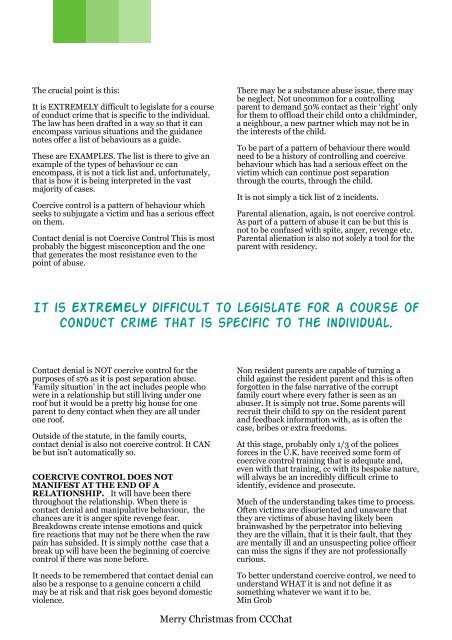CCChat-Magazine_4
Create successful ePaper yourself
Turn your PDF publications into a flip-book with our unique Google optimized e-Paper software.
The crucial point is this:<br />
It is EXTREMELY difficult to legislate for a course<br />
of conduct crime that is specific to the individual.<br />
The law has been drafted in a way so that it can<br />
encompass various situations and the guidance<br />
notes offer a list of behaviours as a guide.<br />
These are EXAMPLES. The list is there to give an<br />
example of the types of behaviour cc can<br />
encompass, it is not a tick list and, unfortunately,<br />
that is how it is being interpreted in the vast<br />
majority of cases.<br />
Coercive control is a pattern of behaviour which<br />
seeks to subjugate a victim and has a serious effect<br />
on them.<br />
Contact denial is not Coercive Control This is most<br />
probably the biggest misconception and the one<br />
that generates the most resistance even to the<br />
point of abuse.<br />
There may be a substance abuse issue, there may<br />
be neglect. Not uncommon for a controlling<br />
parent to demand 50% contact as their ‘right’ only<br />
for them to offload their child onto a childminder,<br />
a neighbour, a new partner which may not be in<br />
the interests of the child.<br />
To be part of a pattern of behaviour there would<br />
need to be a history of controlling and coercive<br />
behaviour which has had a serious effect on the<br />
victim which can continue post separation<br />
through the courts, through the child.<br />
It is not simply a tick list of 2 incidents.<br />
Parental alienation, again, is not coercive control.<br />
As part of a pattern of abuse it can be but this is<br />
not to be confused with spite, anger, revenge etc.<br />
Parental alienation is also not solely a tool for the<br />
parent with residency.<br />
It is EXTREMELY difficult to legislate for a course of<br />
conduct crime that is specific to the individual.<br />
Contact denial is NOT coercive control for the<br />
purposes of s76 as it is post separation abuse.<br />
'Family situation' in the act includes people who<br />
were in a relationship but still living under one<br />
roof but it would be a pretty big house for one<br />
parent to deny contact when they are all under<br />
one roof.<br />
Outside of the statute, in the family courts,<br />
contact denial is also not coercive control. It CAN<br />
be but isn’t automatically so.<br />
COERCIVE CONTROL DOES NOT<br />
MANIFEST AT THE END OF A<br />
RELATIONSHIP. It will have been there<br />
throughout the relationship. When there is<br />
contact denial and manipulative behaviour, the<br />
chances are it is anger spite revenge fear.<br />
Breakdowns create intense emotions and quick<br />
fire reactions that may not be there when the raw<br />
pain has subsided. It is simply notthe case that a<br />
break up will have been the beginning of coercive<br />
control if there was none before.<br />
It needs to be remembered that contact denial can<br />
also be a response to a genuine concern a child<br />
may be at risk and that risk goes beyond domestic<br />
violence.<br />
Non resident parents are capable of turning a<br />
child against the resident parent and this is often<br />
forgotten in the false narrative of the corrupt<br />
family court where every father is seen as an<br />
abuser. It is simply not true. Some parents will<br />
recruit their child to spy on the resident parent<br />
and feedback information with, as is often the<br />
case, bribes or extra freedoms.<br />
At this stage, probably only 1/3 of the polices<br />
forces in the U.K. have received some form of<br />
coercive control training that is adequate and,<br />
even with that training, cc with its bespoke nature,<br />
will always be an incredibly difficult crime to<br />
identify, evidence and prosecute.<br />
Much of the understanding takes time to process.<br />
Often victims are disoriented and unaware that<br />
they are victims of abuse having likely been<br />
brainwashed by the perpetrator into believing<br />
they are the villain, that it is their fault, that they<br />
are mentally ill and an unsuspecting police officer<br />
can miss the signs if they are not professionally<br />
curious.<br />
To better understand coercive control, we need to<br />
understand WHAT it is and not define it as<br />
something whatever we want it to be.<br />
Min Grob<br />
Merry Christmas from <strong>CCChat</strong>


















